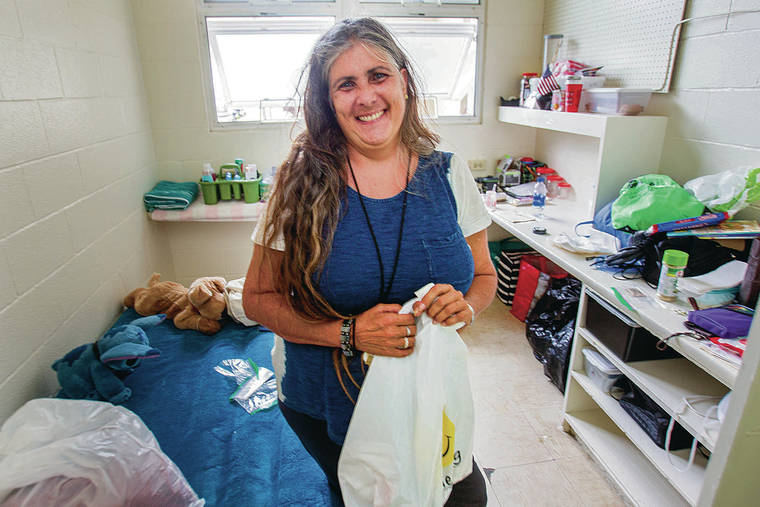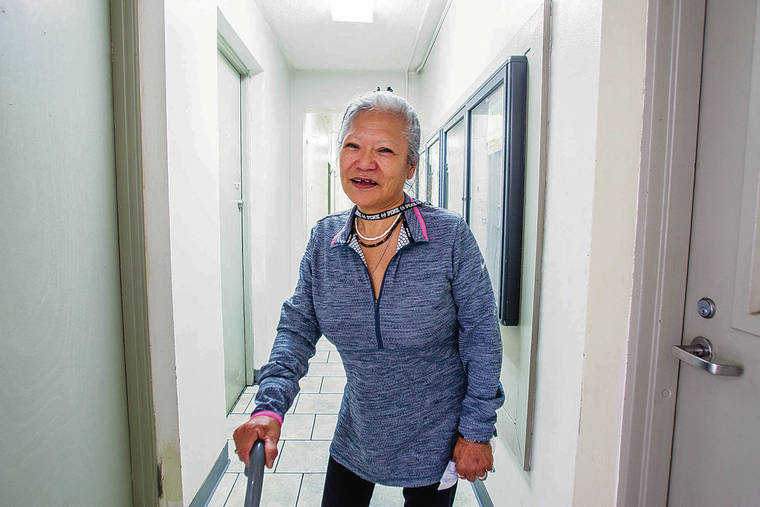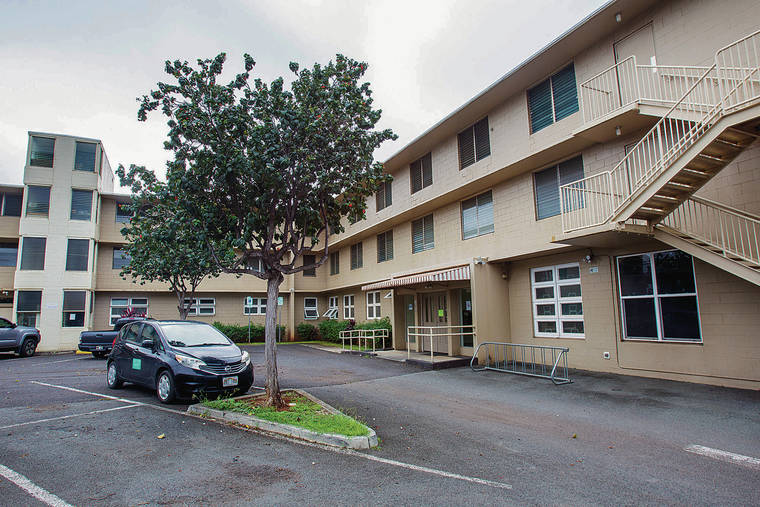Waikiki Health opens a new homeless shelter in Moiliili

DENNIS ODA / DODA@STARADVERTISER.COM
The new homeless shelter, opened by Waikiki Health, can accommodate 76 people. Above, Lyla Reed settled into her new room.

DENNIS ODA / DODA@STARADVERTISER.COM
New resident Sunim Haimoto, 65, walked the hallway Tuesday at Keauhou Shelter. The new homeless shelter, opened by Waikiki Health, can accommodate 76 people.

DENNIS ODA / DODA@STARADVERTISER.COM
Waikiki Health opened its new homeless shelter at the corner of Isenberg and Young streets. The three-story building offers lockable studio apartments — and privacy, with communal bathrooms on every floor.



Waikiki Health, which operates Kakaako’s Next Step Shelter, began welcoming formerly homeless tenants this week into a three-story shelter it now operates in Moiliili.
With 76 single adults and couples expected to move into the 64-unit building on Isenberg Street, Waikiki Health now has the capacity to house 211 homeless people fresh off the street between its Kakaako and Moiliili shelters.
Both are considered emergency shelters and both accept pets, which often provides a barrier to permanent housing and even shelter space.
“The dog is like a family member,” said Jason Espero, Waikiki Health’s director of homeless services.
But unlike the cavernous, open-air Next Step Shelter with its open cubicles, Waikiki Health’s “Keauhou” shelter offers lockable studio apartments — and privacy, with communal bathrooms on every floor.
“I love it,” said Sunim Haimoto, 65, just after she moved in Tuesday from Next Step. “I’m excited and so happy and nervous.”
Don't miss out on what's happening!
Stay in touch with breaking news, as it happens, conveniently in your email inbox. It's FREE!
Haimoto had moved into Next Step a month ago after living on Sand Island for “a long time,” she said.
Asked when she last had a room of her own that she could lock, Haimoto paused and began to tear up.
“A long time ago,” she said, “when I was young.”
Waikiki Health took over the state contract to operate the emergency shelter in October, officially opened for business on Jan. 2 and welcomed its first five tenants from Next Step on Monday.
The goal is to have half of the tenants document-ready, better situated and prepared for permanent housing within 90 days.
Espero said research going back to the 1800s identified the area as Keauhou, which means “a new beginning.”
It was the perfect name for a place designed to provide dignified housing to homeless people looking for a second chance, assisted by three “housing navigators” who will help the new tenants with everything from getting government-issued IDs, government financial assistance and, eventually, permanent housing.
“We are very happy to have this opportunity to provide services to more folks,” said Phyllis Dendle, Waikiki Health’s chief executive officer. “We’ll be able to provide emergency housing for 76 people in a Housing First model. We take them as they are, we get them under roof and then we help them find a place to live and all of the things that come with it, such as employment. We try to help them with all of those things.”
Asked to compare Keauhou with Next Step, Dendle was blunt.
“It’s absolutely nicer,” she said. “They can lock their stuff and never have to worry.”
There are two bathrooms on each floor, rooms for communal spaces, a communal dining and kitchen area, space for soon-to-be- installed coin-operated laundry machines and plans for behavioral health treatment.
Tenants are expected to pay $150 a month in rent. Those who can’t afford the rent can live for free while housing navigators work to secure them government financial assistance, such as welfare or Social Security.
Waikiki Health provides one meal a day.
The shelter is the only one of its kind in an area inundated with homeless encampments on Isenberg and Young streets, and especially in and around Old Stadium Park.
“Before the end of this month, we hope to be full because we know there’s a need,” Espero said. “We are very happy to have this opportunity.”
New tenant Lyla Reed, 55, moved into Keauhou on Monday from Next Step.
Before then Reed had been living “all over the place. … All over,” after leaving an abusive husband eight years before.
With a breeze blowing into her new apartment, Reed had her belongings spread all over — something she could not do at Next Step.
“Thank God,” she said. “At Next Step you don’t have a roof over your head and a door to lock.”
Now Reed is daring to believe in a new future, one that includes a job and her own home.
“Now I want my own place,” she said.



